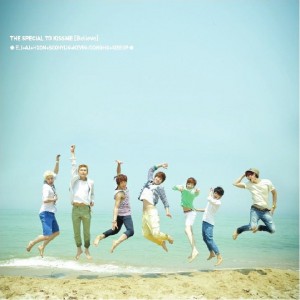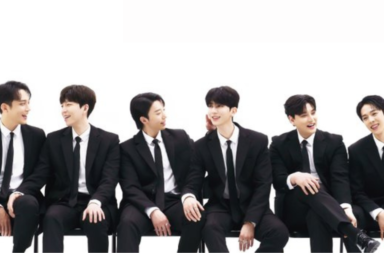Welcome to another Seoulbeats Exchange, everyone! This week, I take a much needed look at a group that I have long overlooked: U-Kiss.
My knowledge of U-Kiss is minimal: all I know is that they had a guy in a man-bra for one MV, know maths, speak a lot of languages, and are generally regarded as the perpetual underdogs of the K-pop world. Though they debuted in 2008, newer fans would be more familiar with the group’s from 2011 onwards–my own introduction to U-Kiss was with “0330,” and “Neverland” was enjoyable enough, though they had been put on the back burner despite multiple releases in 2012. The recent success of “Stop GIrl,” though, title track of the group’s 7th mini-album, makes me think that I should get to know the group more. But a long history mixed with many changes does not necessarily make for easyt understanding, and so I’ve turned to Paloma, Jasper and Patricia to give me some clarity.
1. What, in your eyes, makes U-Kiss stand out from other idol groups? What is U-Kiss’ appeal?
 Jasper: I’m having a bit of trouble answering this question as well, but when it comes down to it, I think U-Kiss’s main appeal or distinction is their underdog status and their genuine hard work to overcome it. Much like Secret‘s case but only more amplified, U-Kiss has this underdog-aspect to them that just makes you want to cheer for them. They’re notoriously not the most fortunate idols around in terms of popularity, not being able to win a single weekly music award in their four years of idoldom despite some genuinely great releases later on. Their improvement is insanely apparent, and to see that it hasn’t translated to a major increase in popularity is disappointing, making fans want to cheer for them even more. Their recent pieces especially have shown great quality, and it’s clear that the U-Kiss members work really hard to achieve this quality and to get to where they are today. It’s just sad that they haven’t been rewarded for this hard work.
Jasper: I’m having a bit of trouble answering this question as well, but when it comes down to it, I think U-Kiss’s main appeal or distinction is their underdog status and their genuine hard work to overcome it. Much like Secret‘s case but only more amplified, U-Kiss has this underdog-aspect to them that just makes you want to cheer for them. They’re notoriously not the most fortunate idols around in terms of popularity, not being able to win a single weekly music award in their four years of idoldom despite some genuinely great releases later on. Their improvement is insanely apparent, and to see that it hasn’t translated to a major increase in popularity is disappointing, making fans want to cheer for them even more. Their recent pieces especially have shown great quality, and it’s clear that the U-Kiss members work really hard to achieve this quality and to get to where they are today. It’s just sad that they haven’t been rewarded for this hard work.
However, other than that, I find it hard looking for any other distinct quality that belongs to U-Kiss alone. As we’ve said numerous times before, U-Kiss has all the factors to make a successful boy group, arguably having elements even better than others. But as true as that may be, U-Kiss doesn’t have a distinct flavor to them that stands out from other groups. Especially during their debut, U-Kiss lacked a gimmick or distinction to them; they didn’t have something akin to 2PM‘s beast idol concept, B1A4‘s country-dol aspect, or SHINee‘s noona-baiting ways that would attract at least some attention immediately. The closest thing they had were their “world idol” titles, stemming through their extreme proficiency in languages, but to be perfectly honest, that didn’t make the most potent of concepts.
Patricia: If you asked this question even just a year or two ago, I would have said that U-Kiss has no real appeal as an idol group. There are some good singers and some good dancers in U-Kiss, and they’re relatively funny, but they’re not talented enough to boost their careers to the top by the sole merit of their talent. In fact, I’d argue that most of U-Kiss’ peer groups aren’t talented enough to make a career just from their talent. But the difference lies in the fact that U-Kiss’ peers have strong management and strong connections that help them make their way to the top. U-Kiss has suffered from a combination of bad artistic staff, poor management, lack of industry connections, and lack of influence, and it’s the sum of those parts that makes U-Kiss comparatively forgettable.
But now, I think U-Kiss is gaining more attention lately not because their circumstances have improved, but because their awkward place in the industry is becoming increasingly apparent. They’re the only real “sunbae” group that hasn’t either made their way to success or fallen off the K-pop radar. They’re the oldest nugu group out there right now. At this point, I think most people regard U-Kiss with a sense of either pity for not being able to sit at the cool kids’ table for more than four years, or admiration for having the gumption to keep on going. It depresses me to say this as a U-Kiss fan, but I think the primary reason for U-Kiss’ appeal right now is rooted in the instinct to cheer for the underdog…which, if you want to put it less nicely, is just another word for pity.
2. What gave impetus to the member change that occurred in 2011, and how much has it affect U-Kiss and its music?
 Paloma: I honestly wasn’t a fan when the member change happened, so I can’t say much about this. But I do think that NH Media has serious management problems, I think they only manage Paran and U-Kiss nowadays and look where they are now — I don’t even know if Paran exists anymore. So I think changing members was a desperate measure from a company that didn’t know what else to do for their group to success.But it is true that after the members change, U-Kiss’s music became much better, because it also coincided with a change in the producers (or more like finally getting rid of Brave Brothers). I think U-Kiss somehow changed their identity after that; before they were great for varieties but probably underexploited, Xander and Kibum were hilarious, but they weren’t exactly musically talented, and they were some timid attempts to make them some sort of variety-dols — which I think could have been a good idea — but they obviously weren’t enough. AJ and Hoon are a good addition because they matched the new identity of the group, with better songs and better performances. Hoon was a good support for Soohyun and Kevin since Eli and Dongho barely sing, and AJ is just flawless in everything he does (totally unbiased opinion, OK?).
Paloma: I honestly wasn’t a fan when the member change happened, so I can’t say much about this. But I do think that NH Media has serious management problems, I think they only manage Paran and U-Kiss nowadays and look where they are now — I don’t even know if Paran exists anymore. So I think changing members was a desperate measure from a company that didn’t know what else to do for their group to success.But it is true that after the members change, U-Kiss’s music became much better, because it also coincided with a change in the producers (or more like finally getting rid of Brave Brothers). I think U-Kiss somehow changed their identity after that; before they were great for varieties but probably underexploited, Xander and Kibum were hilarious, but they weren’t exactly musically talented, and they were some timid attempts to make them some sort of variety-dols — which I think could have been a good idea — but they obviously weren’t enough. AJ and Hoon are a good addition because they matched the new identity of the group, with better songs and better performances. Hoon was a good support for Soohyun and Kevin since Eli and Dongho barely sing, and AJ is just flawless in everything he does (totally unbiased opinion, OK?).
In short, U-Kiss was mismarketed when they first debuted, and the change unfortunately came too late. Yet as I said, I don’t think it was that much the members change as the musical change — or maybe I can’t just blame Xander and Kibum because they were the cutest.
 Jasper: I wasn’t even aware of U-Kiss when the change happened either, but really, the change in members came out of U-Kiss’s inability to mesh with the Korean public. Already years into their idol careers, U-Kiss was just not able to create a big enough fanbase at home, and thus NH Media was desperate, employing a major change in their flagship group in an effort to gain more fans. And so, NH Media chose to eliminate Xander and Kibum from the group, and employ AJ and Hoon instead. But the foundation in U-Kiss wasn’t necessarily that stable either; many people, including admittedly me, forget that Kiseop was added as a seventh member back in 2009.
Jasper: I wasn’t even aware of U-Kiss when the change happened either, but really, the change in members came out of U-Kiss’s inability to mesh with the Korean public. Already years into their idol careers, U-Kiss was just not able to create a big enough fanbase at home, and thus NH Media was desperate, employing a major change in their flagship group in an effort to gain more fans. And so, NH Media chose to eliminate Xander and Kibum from the group, and employ AJ and Hoon instead. But the foundation in U-Kiss wasn’t necessarily that stable either; many people, including admittedly me, forget that Kiseop was added as a seventh member back in 2009.
Patricia: The member change in 2011 was meant to be part of a bigger change in direction for U-Kiss — you can see where their musical and visual aesthetic took a drastic turn (for the better, in my opinion) with the release of Bran New Kiss. As much as Kibum and Xander are missed, replacing two members helped U-Kiss start fresh, and in a way it symbolized U-Kiss’ departure from the past. To be honest, I don’t think that neither the addition of Hoon and AJ nor the elimination of Kibum and Xander alone have made much of an impact to the group. To this day I’m not sure why Kibum and Xander were the ones who got the boot, or why NH Media saw such value in Hoon and AJ that they just had to add them to the U-Kiss roster. That’s why I think the significance in changing the members lies not with the members themselves, but rather with the symbolism that changing members = changing direction. And that change in direction is clearly evident with U-Kiss’ musical output post-Bran New Kiss.
3. U-Kiss has a very devoted fanbase, but it is purported to have a higher proportion of international fans than domestic. Do you agree with this assessment, and would you say it is proof that an international fanbase cannot make for the lack of support in Korea? Also, why the difference in levels of International and Korean fans?
Paloma: I think international fans tend to root more for the underdogs; it’s just a tendency they have because they somehow have more freedom in what they watch and hear, while Korean fans are probably more influenced by what they see on TV or hear on the radio. Just a theory, but it does happen that international fans favor the underdogs — look at Hyoyeon in SMTown Paris. So yeah, U-Kiss has the approval of international fans, but I’m convinced it doesn’t make it up for the lack of Korean fans, sadly. International fans don’t spend that much money (probably just because they can’t, we just don’t have access to lots of things), and they can’t make them win on a music program, which although theoretically is just symbolic, it is obviously important for the overall perception of the group and for their own self-esteem.
 Patricia: International fans consume K-pop in a completely different way than Korean fans. Our intake of K-pop news is very concentrated and the level of exposure we get of certain K-pop groups and artists is highly disproportionate to what people see in Korea. Amongst the international K-pop fandom, I’d guess that the ratio between news on nugu groups like U-Kiss, F.Cuz, Spica, what-have-you and news on well-known groups like Super Junior, SNSD, and Big Bang is probably around 1:2. That’s the only picture of K-pop that we as international fans get, But in Korea, people don’t get their K-pop news from a website that gives all K-pop groups a relatively fair level of exposure. Their exposure to K-pop idols depends heavily on which idols get the most product endorsement deals, or how many times you’ll see a certain idol’s face on a billboard or a commercial for fried chicken. Basically, international fandom gives groups like U-Kiss a lot more exposure than what they’re getting in Korea — and it’s not because international fans have a greater appreciation for U-Kiss than Korean fans; it’s just a product how the international K-pop news system works.
Patricia: International fans consume K-pop in a completely different way than Korean fans. Our intake of K-pop news is very concentrated and the level of exposure we get of certain K-pop groups and artists is highly disproportionate to what people see in Korea. Amongst the international K-pop fandom, I’d guess that the ratio between news on nugu groups like U-Kiss, F.Cuz, Spica, what-have-you and news on well-known groups like Super Junior, SNSD, and Big Bang is probably around 1:2. That’s the only picture of K-pop that we as international fans get, But in Korea, people don’t get their K-pop news from a website that gives all K-pop groups a relatively fair level of exposure. Their exposure to K-pop idols depends heavily on which idols get the most product endorsement deals, or how many times you’ll see a certain idol’s face on a billboard or a commercial for fried chicken. Basically, international fandom gives groups like U-Kiss a lot more exposure than what they’re getting in Korea — and it’s not because international fans have a greater appreciation for U-Kiss than Korean fans; it’s just a product how the international K-pop news system works.
And plus, I think U-Kiss was always intended to cater to the international market. I mean, putting Kevin and Eli into one group? Putting in Xander, the kid who could speak seven languages (but in reality could speak none)? And doesn’t Kibum speak a little Japanese? And their group name is an acronym that stands for “Ubiquitous Korean International idol Super Star,” for goodness’ sake. Apparently, that’s what “international” meant back in 2008, and as ridiculous as that sounds right now, I think it’s fair to assume that U-Kiss’ international “appeal” caught the eye of some international fans way back when, and some of these first few U-Kiss fans are still around to keep the U-Kiss fandom flame going.
4. If you were put in charge of U-Kiss, what measures would you put in place to better their market position?
 Jasper: Really, I’d also put more emphasis on overseas efforts such as their Japanese efforts for U-Kiss since they just seem to have a better advantage there. “Tick Tack” was already an amazing release, showing much potential for U-Kiss in Japan, and they seem to be fairly serious about their Japanese efforts as well. More overseas releases would definitely be for U-Kiss’s benefit, since not only would it cause a potential increase in fans overseas, but it can also boost U-Kiss’s reputation and credibility at home being seen as successful Hallyu stars — as overused and exaggerated the word has become — and subsequently gain more attention through that.
Jasper: Really, I’d also put more emphasis on overseas efforts such as their Japanese efforts for U-Kiss since they just seem to have a better advantage there. “Tick Tack” was already an amazing release, showing much potential for U-Kiss in Japan, and they seem to be fairly serious about their Japanese efforts as well. More overseas releases would definitely be for U-Kiss’s benefit, since not only would it cause a potential increase in fans overseas, but it can also boost U-Kiss’s reputation and credibility at home being seen as successful Hallyu stars — as overused and exaggerated the word has become — and subsequently gain more attention through that.
Unfortunately, the limitations U-Kiss faces coming from a smaller company would hamper most of their home efforts despite the quality of their material since bigger, more influential companies would serve as too tough of competition. But at least in foreign markets, U-Kiss would have more of an equal chance and even more advantages since communication is much more accessible for them compared to other groups. This would open U-Kiss up to variety shows, talk shows, dramas, and a full media experience in a foreign market, something most groups don’t have access to due to their minimal linguistic skill.
Patricia: Ever since 2011, I think NH Media has been doing the best they can with U-Kiss, to the point where I don’t think I would personally have any valuable advice to give them. The things that NH Media does need are things that are largely out of control. They need more money. They need a larger networking web. They need to build a larger sphere of influence in the industry. Like I said before, the reason why U-Kiss isn’t succeeding now isn’t because their music is bad; it’s not even because their members aren’t talented enough. It’s because they and their management just don’t have the same level of influence as their more successful counterparts. Ever think why Soohyun still hasn’t landed a place on Immortal Song 2? Stuff like getting your idols a spot as a regular on a variety show takes industry connections, which is something that I suspect NH Media lacks.
5. But coming back to reality, how far in the industry do you think U-Kiss can go?
 Paloma: Even if it pains me, I don’t think they’ll go much further than they are now. The idol system is way too fast as to give second chances, and U-Kiss’s moment to stand out is already gone; it’s enough for me if they manage to stay relevant even if they are considered a “second-line group”, I’m just sorry you are not considered successful inside the K-pop system if you don’t win a music program.
Paloma: Even if it pains me, I don’t think they’ll go much further than they are now. The idol system is way too fast as to give second chances, and U-Kiss’s moment to stand out is already gone; it’s enough for me if they manage to stay relevant even if they are considered a “second-line group”, I’m just sorry you are not considered successful inside the K-pop system if you don’t win a music program.
Jasper: I actually think U-Kiss can go just a little bit further in terms of their career. I honestly think they’ll never be able to reach national group status, but I think that the group has a little bit more into them to keep going and hopefully make better and better releases. U-Kiss was already on overdrive this year, releasing single after single with little break in between, and their quality is definitely continually increasing. I’d like to think U-Kiss will someday be rewarded for their efforts with at least a music show win. And really, all it takes to experience a major surge in popularity is one song. I mean look at T-ara and “Roly Poly” or even Secret with “Shy Boy.” While I’m definitely against U-Kiss resorting to redundant hooks like the above examples, all I’m saying with a market as fickle as K-pop, anything can happen, and all it takes for things to happen is one song that can please the masses.
Patricia: As far as idoldom is concerned, U-Kiss cannot go any further than they already are unless their management increases their sphere of influence. The problems that U-Kiss suffers are similar to those that indie artists have to deal with, but U-Kiss has that much more difficulty reconciling with their status in the industry because they are idols, not indie musicians, and they lack the ability to gain the public exposure that they need in order to be successful idols. I wish there was such a thing as dancing and singing indie boy bands, because U-Kiss would fit perfectly in that. But U-Kiss has been trying to enter mainstream idoldom for four years now, and despite the amount of improvement they’ve shown since their debut and the high quality of their music, they just don’t have the connections that they need to make it. It’s tragic, but I think a case like U-Kiss really reveals how important of a factor influence is when it comes to the idol industry.
– – – – – – –
 As the saying goes, it’s not what you know but who you know, and the K-pop industry would, like many other entertainment industries, also subscribe to this maxim. It is sad to think that U-Kiss is restricted by nepotism rather than ability, but that seems to be the harsh reality. Though not a Kiss-me myself, I can sympathise with the feeling that even despite U-Kiss changing almost everything about it to emerge as a new group, to take the biggest gamble by doing so, the group is still not see any tangible benefit beyond perhaps a mild increase in sales and increasing grass-roots support among (I guess, mostly international) fans.
As the saying goes, it’s not what you know but who you know, and the K-pop industry would, like many other entertainment industries, also subscribe to this maxim. It is sad to think that U-Kiss is restricted by nepotism rather than ability, but that seems to be the harsh reality. Though not a Kiss-me myself, I can sympathise with the feeling that even despite U-Kiss changing almost everything about it to emerge as a new group, to take the biggest gamble by doing so, the group is still not see any tangible benefit beyond perhaps a mild increase in sales and increasing grass-roots support among (I guess, mostly international) fans.
U-Kiss is the perfect case study for the differences between Korean and international fans. The criteria used to evaluate groups, the ways in which we gain access to these groups, the impact of fan activity on the groups’ careers–these are all areas in which the two groups of fans differ. But it’s not as though international fans are enjoying K-pop without being influenced by marketing; cross-promoting one idol group with another, having idols appear of variety shows and dramas, the recent promotional with K-pop news sites and, of course, the fans themselves, are factors which influence international fans, but a different set of values and experiences outside of Korean culture brought into K-pop affects the way in which we consume it. Yet as much as companies like to chase after international fans, at the end of the day we are but a peripheral demographic that does not wield the type of market power the domestic fanbase does.
In that regard, Jasper’s viewpoint given in the last question is –it only takes one song for U-Kiss to receive critical appreciation, more sales, more ground support, and perhaps that elusive music show win. “Stop Girl” could be that song, having received all around good reviews (including from Seoulbeats) and interested more non-fans (such as myself), but I already know that they are not going to win an award for it. Why? Because they will soon be promoting at the same time as TVXQ, and even they have Psy’s success to figure; as noted above, timing has never been on U-Kiss’ side. U-Kiss’ musicality seems to be getting stronger and stronger, but is still unable to find Korea’s musical sweet spot. They can always keep trying, but circumstance is also a big part of success, and apart from making your own luck (probably using the resources that U-Kiss don’t have access to, as listed by Patricia), all that can probably be done is to continue making good music. And cross your everything.
(NH Media)


